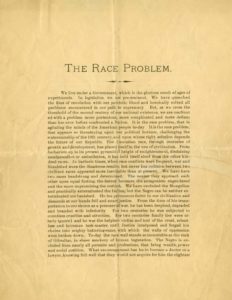Post About “The Race Problem” by W. B. Brewster, Class of 1892
This text is part of a collection of student work from the Fall 2017 class HIST 294-04/AMST 294-01, Public History: African American Life — Past, Present and Future. Students selected, described, and analyzed items from the Macalester Archives pertaining to Black history. The entire class collection can be found here.
“The Race Problem,” through the eyes of a member of the Macalester Class of 1892.
Questions of race and racism are still prevalent at Macalester in 2017, and this document gives us insight into the thoughts of a Macalester student 125 years ago. The document shows its age: the pages are yellowed, the fold in the paper has been ripped through by use in all but a few places, and the edges are frayed and torn, but it gives us very little context. There is no date and it is filed alone in a folder without any other documents that could give us more clues. All we know is that the author has signed his name, W. B. Brewster, class of 1892. A little digging in the Macalester student newspaper archives, however, does provide more information. The College Echo published on April 14, 1890 includes a paragraph on the results of the recent oration contest, in which Brewster won second place for this essay. With this article, we also learn that “the burst of applause” that followed his speech “showed that Mr. Brewster had not a few friends in the audience,” presumably showing support for the content of his oration as well as his delivery.
Brewster’s main point is to call attention to the racism that is preventing the United States from reaching its potential. On paper, he argues, this country is established on “the path to supremacy;” we are a “pre-eminent” nation. Yet, tensions between the “Caucasian race” and the “Negro race” “have never appeared more inevitable than at present.” The remaining pages of the essay focus primarily on anti-black racism in the United States—Brewster only acknowledges other identities in passing. He writes, we have excluded the “Mongolian race,” and he meant that quite literally at the end of the nineteenth century due to the Chinese Exclusion Act of 1882. The “Indian,” too, is written out of the picture because “we have practically exterminated [them].” So, to return to Brewster’s summary of anti-black racism, we read that the history of this country is tied to exploitation of Black lives.
For two centuries he was subjected to countless cruelties and atrocities. For two centuries family ties were utterly ignored and he was the helpless victim and tool of the cruel, relentless and inhuman and task-master, until Justice interposed and forged his chains into mighty battering-rams, with which the walls of oppression were broken down.
Slavery was dehumanizing and indescribable in its damage, but we have also broken down those walls, and broken out of those chains. That is the sense in this quote at least– presumably a popular sentiment of the time given the Emancipation Proclamation and the Thirteenth, Fourteenth, and Fifteenth Amendments. However, Brewster is quick to judge the failures of these laws and Reconstruction in general. “To-day the race wall stands as immutable as the rock of Gibraltar, in sheer mockery of human legislation.” Long before “separate-but-equal” became the justification for continued racism in the law, the author wrote about the hypocrisy of the nation and the gulf between the rights guaranteed on paper and the experiences of day-to-day life.
It is this inconsistency that is the crux of Brewster’s argument: he wants his reader to recognize the great inequality in the nation. By the end of the essay, it becomes clearer that the expose is not merely academic but also a call to action. “He [the Black man] has been a citizen only nominally and suffrage has been to him an abominable mockery.” It is this wrong we must right: “the bullet must be exchanged for the ballot, the invincible bulwark of our Liberty.” It seems, too, that Macalester students can and ought to play a role in realizing this change.
–Amy Pascoe
Brewster, W. B. “The Race Problem.” The Race Problem Folder, Multicultural Affairs Collection. Macalester College.
Chow, Kat. “As Chinese Exclusion Act Turns 135, Experts Point to Parallels Today.” Code Switch, NPR. May 5, 2017.
“Oratorical.” The College Echo. Macalester College. April 14, 1890.
MetadataTitle: Post About “The Race Problem” by W. B. Brewster, Class of 1892
Creator: Pascoe, Amy
Description: This text is part of a collection of student work from the Fall 2017 class HIST 294-04/AMST 294-01, Public History: African American Life — Past, Present and Future. Students selected, described, and analyzed items from the Macalester Archives pertaining to Black history. The entire class collection can be found in the Fall 2017 Public History Class tag.
Date Created:
Dates of Content: April, 1890
Type of Content: Text
Source: Brewster, W. B. “The Race Problem.” The Race Problem Folder, Multicultural Affairs Collection. Macalester College.
URL: https://dwlibrary.macalester.edu/counterbalance/student-projects/the-race-problem-by-w-b-brewster-class-of-1892/
Suggested Citation: Pascoe, Amy. "Post About “The Race Problem” by W. B. Brewster, Class of 1892." Counterbalance, Macalester College Archives. . Text. https://dwlibrary.macalester.edu/counterbalance/student-projects/the-race-problem-by-w-b-brewster-class-of-1892/.
